Kate Rauner's Blog, page 74
March 26, 2016
What If Search for ET Found Us? #SETI #alien #science #space
Now that we know how to look for exoplanets… maybe we know how  intelligent aliens are looking for us.
intelligent aliens are looking for us.
Astronomers suggest that future searches focus on that part of the sky in which distant observers can notice the yearly transit of Earth in front of the Sun… Observers in this zone could have discovered Earth with the same techniques that are used by terrestrial astronomers to discover and characterize exoplanets.
This wouldn’t solve any of the barriers to communication – mostly the vast distances involved and the huge transmission lag, even for signals at the speed of light. I’m not sure if it would be exciting or terribly sad to know there was an Earth-like planet out there that we can see and can see us, but we can’t exchange a “hello.”
Filed under: Neat Science News Tagged: alien, ET, exoplanet, Max Planck Institute, search for extraterrestrial life, SETI








March 23, 2016
Call for Help #Firefighter #Fire #Volunteer
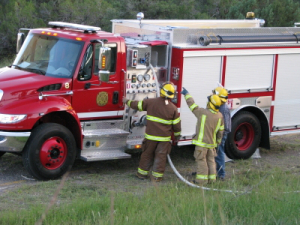
My department about to start a training exercise
A call in the nighttime
Blasts me from my dreams,
Someone’s in trouble
The radio screams.
Don gear at the station
Before taking a truck,
To find the right driveway
Can sometimes take luck.
I have the training
I’ll be okay,
So I can run towards
While you run away.
My fate’s in my hands
From the training I choose,
Equipment and practice
Between win and lose.
Smell of the smoke,
Dance of the flame,
Puzzles to solve
In areal-life game.
It takes up my time,
Puts me in danger,
But I keep volunteering,
Help neighbor and stranger.
By Kate Rauner
Filed under: Poetry Tagged: poem, poetry, volunteer firefighter








March 19, 2016
Science fiction is a really big place #scifi #hardsf #books #fantasy
Science fiction is huge – there’s a story for everyone.
Amazon’s Kindle offers twenty categories of scifi. Here they are:
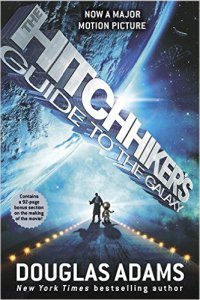
One of my favorites – scifi satire
Adventure
Alien Invasion
Alternative History
Anthologies & Short Stories
Classics
Colonization
Cyberpunk
Dystopian
First Contact
Galactic Empire
Genetic Engineering
Hard Science Fiction
LGBT
Metaphysical & Visionary
Military
Post-Apocalyptic
Space Exploration
Space Opera
Steampunk
Time Travel
And that doesn’t include the separate “fantasy” categories.
Here are two books I read recently that seemed to only marginally be science fiction.
Never Let Me Go (Kazuo Ishiguro) is the story of orphans growing up in a boarding school and facing their miserable future with resignation. Amazon lists it as a scifi dystopian (though to be fair it’s also listed under Literary Fiction which seems a better fit to me.) Here’s the scifi part: the orphans are clones raised so their organs can be harvested. The book is so acclaimed that I had to finish it, but it left me feeling puzzled.
The Water Knife (Paolo Bacigalupi) is a tale of mean streets – gangs, prostitutes, drugs, corruption and intrigue, and a crusading journalist. Between murders and violence the characters do a lot of ruminating on their situation. It’s a scifi dystopian (and also Literary Fiction/Thriller). The scifi part is that all this misery is caused by climate change droughts that leave vast swathes of America uninhabitable. Not being big into murderous gang wars, I didn’t finish it.
After reading these books, I looked the term up on Google.
sci·ence fic·tion
noun: fiction based on imagined future scientific or technological advances and major social or environmental changes, frequently portraying space or time travel and life on other planets.
Since science and technology permeate our real world, the key for me is “future-advances-changes.”
Richard Treitel found this added element I like, attributed to Ben Bova:
A work shouldn’t count as SciFi unless the science is necessary to it.
Not just adventures (or romances, or …) with high-tech props, resembling science fiction the way Hamlet resembles a history of Denmark. Not just present-day fiction in an exotic setting.
Richard Treitel offers other quotes, too.
Hard science fiction is where science and technology seem real and are ‘characters’ in the story. [Brad Templeton]
Fantasy deals with the impossible, while SF deals with the possible. [Doug Tricarico]
Stories that show us a way of life that has been shaped by the science or technology in the story. [Anon]
Wikipedia says scifi is speculative, futuristic, and explores the consequences of scientific advances – while avoiding the supernatural. They note the original need to tie the story to science-based facts and theories has become “tenuous” over time. It seems hard to find a scifi story today without supernatural characters – and most authors give up altogether on the current physics that puts other star systems vastly out of our reach. We want “new worlds, new life, and new civilizations.”
Are Dragons Always Fantasy? Can They Be Scifi?
Specifically, the dragons in Anne McCaffrey’s Pern books. Humans journey to another planet, lose touch with Earth, and build a sort of medieval feudal society. They find creatures like small dragons with traits that say “fantasy” to me – they’re telepathic, and can travel instantly between places and times. They breed these little guys bigger until they can ride them to purge the skies of alien parasites that travel through space from a neighboring planet.
another planet, lose touch with Earth, and build a sort of medieval feudal society. They find creatures like small dragons with traits that say “fantasy” to me – they’re telepathic, and can travel instantly between places and times. They breed these little guys bigger until they can ride them to purge the skies of alien parasites that travel through space from a neighboring planet.
Hmm. Sounds like fantasy despite arriving in a space ship and fighting alien parasites. But on Amazon the books are called space opera, time travel, and colonization under science fiction – but never fantasy! BTW, the stories are still wildly popular after fifty years! I pass on most of the books I read, but recently I picked up a used copy of The Dragonriders of Pern because I missed seeing it on my shelf.
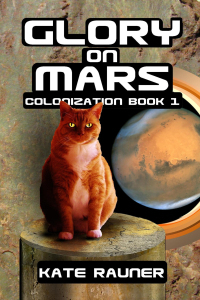 I’m not so interested in gang warfare or boarding-school romance in my scifi. My own writing takes me to space, most recently to the first colony on Mars – all in a believable-future. They’re stories of people who could be real, using technologies we don’t yet possess but may sometime soon, doing things you might do yourself in their place – fighting to survive hostile worlds and human conflicts. Take a look. :)
I’m not so interested in gang warfare or boarding-school romance in my scifi. My own writing takes me to space, most recently to the first colony on Mars – all in a believable-future. They’re stories of people who could be real, using technologies we don’t yet possess but may sometime soon, doing things you might do yourself in their place – fighting to survive hostile worlds and human conflicts. Take a look. :)
But science fiction is a very big place. You’ll find a home here.
Filed under: Kate's Books, Science Fiction Tagged: best scifi, genre ficiton, Sci Fi, SciFi, sf, what is science fiction








March 18, 2016
Glory on Mars in top 6% of its #kindle #scifi category
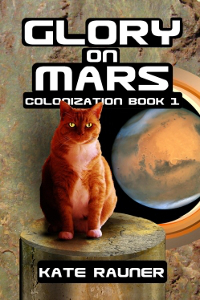 Forgive me if I brag.
Forgive me if I brag.
I just checked the ranking of my book Glory on Mars in Amazon’s kindle store. It’s listed under science fiction in three categories: space exploration, colonization, and hard science fiction.
In its top category – hard science fiction – Glory is in the top 6%. Not bad in the other categories either – 18%
Yee ha – thrill for me! Thanks to you!
If you haven’t read it yet, download a free copy today – see how here.
Please post a review or rating on Amazon, Goodreads, or wherever you hang out. Reviews help keep my ranking up which means other readers can find my book. I really appreciate your help.
Thanks to all my followers and friends.
Amazon ranks are always changing, so I better hurry and post this.
Filed under: Kate's Books, Science Fiction Tagged: Amazon, best scifi, book, ebook, kindle, Mars colony, Sci Fi, science fiction, SciFi, sf








March 16, 2016
Brian’s Spider #science #biology #poem #poetry #spider #physics #gravity
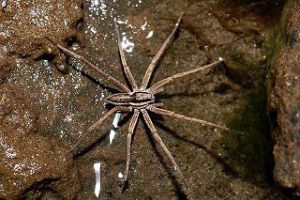
A related fishing spider – Brian’s spider is newly identified
Waves across the universe
Ripple time and space,
While on the Earth a spider
Finds waves more to its taste.
Oh, to be so famous,
One of physics’ best.
Oh, to be immortalized,
Known for your quantum quest.
Oh, to be so honored,
To have your name applied
To another bit of nature
That on a waveform glides.
A dark and leggy spider
That dives in southern ponds
Or strides across their surface
Until its prey is found.
Your name will ride, oh Brian Greene,
On waves of gravity,
Or maybe longer will endure
In a name that’s spidery.
By Kate Rauner
Physicist Brian Greene is also a founder of World Science Festival, an annual event in New York City – alas, half a continent away from me – and for the first time in Brisbane, Australia – even farther.
Brian explains the discovery of gravity waves here. Who says string theory never leads to anything real?
Thanks to Filed under: Poetry Tagged: fish eating spider of Australia, gravitational wave, gravity wave, Physics, water spider Dolomedes briangreenei, World Science Festival 







March 12, 2016
Stupid Worse Than Evil? #science #robotics #technology #artificialintelligence #AI
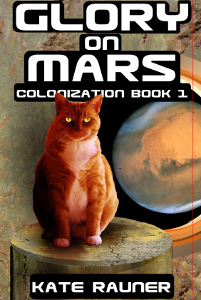 In my science fiction story about colonizing Mars, I send robots ahead to prove out construction methods and then work with the colonists. They have an Artificial Intelligence, too, to rely on. It seems unreasonable to write about humanity’s near future in space without robots and AIs.
In my science fiction story about colonizing Mars, I send robots ahead to prove out construction methods and then work with the colonists. They have an Artificial Intelligence, too, to rely on. It seems unreasonable to write about humanity’s near future in space without robots and AIs.
But are they a good idea?
Some have speculated robots might kill us off even if programmed to create maximum happiness – since humans are a sorrowful lot, an AI might decide eliminating humans would make the world a happier place. Or maybe they’ll just decide we’re too stupid to keep around (which is sorta what happens in The Terminator.)
Or disaster may be our own fault.
Humans can be way too trusting of robots—and that our

HAL – not evil but deadly
inclination to follow our robotic overlords could actually be a very dangerous human behavior that needs to be taken into account when designing everything from autonomous vehicles to emergency evacuation tech.
Scientists developing robots to lead people in high-rises to safety in case of a fire discovered people would follow the robot even when it made obviously dangerous and ridiculous errors. We seem all too ready to shift our brains into neutral and follow orders.
I see echoes of this problem in myself. I can no longer remember the date because my phone will tell me. I hop in a car without a thought to where I’m going because the GPS will tell me. I’m ready to hop into a self-driving car, too. Good luck to me.
How about you – ready to let an AI drive you to the grocery store? or fly you to Mars?
Thanks to fastcodesign.com
Filed under: Kate's Books, Neat Science News, Science Fiction Tagged: AI, Artificial intelligence, best scif fi, hardsf, Mars colony, near future in space, programming, robot, science fiction, sf








March 9, 2016
Natural GMO #GMO #poem #poetry #science #biology #evolution
What never lived
But yet evolved?
Retained itself
In species broad?
Shares DNA
But never sex?
Familiar beast
You don’t expect?
Rhyming riddles are hard to write – feel free to offer your own couplets in the comments. I bet you’ll do better than I did. Kate
Researchers from Boston College, US, are studying an ancient group of retroviruses that affected many modern mammal ancestors 30 million years ago. Viruses that colonized our ancestors and, “over the course of millions of years, however, viral genetic sequences accumulate in the DNA genomes of living organisms, including humans.”
Thanks to phys.org/news
Filed under: Poetry Tagged: biology, DNA, evolution, genetically modified organism, germ, GMO, microbiology, science, virus








March 5, 2016
Potatoes for Mars #Mars #NASA #space #science

A few of the many potato varieties
Who knew there’s an International Potato Center? There is – in Peru. They’re teaming with NASA to grow potatoes in soil taken from the Atacama Desert. Peru has 4,000 varieties of potatoes to choose from.
[Like Mars, Atacama soil has] extremely low levels of microorganisms and organic material as well as high levels of oxidizing chemical elements. For these reasons, the soils in Atacama have been used as analogous to Mars in research scenarios.
They’ll freeze the potatoes they grow and try to revive them. Is it possible The Martian could have revived his frozen potatoes? That would have made life on Mars a lot more comfortable.
Eventually, NASA wants to grow potatoes in zero gravity, in an enclosed atmosphere inside a CubeSat in space. Then, someday, in an enclosed greenhouse on Mars.
Growing potatoes for Mars will teach us about feeding people on Earth, too.
We see the science, educational, and humanitarian goals as being intertwined. In the process of working together toward establishing a community on Mars, our students will also be establishing a community on Earth.
Science fiction has settled on the potato for Mars colonists. I’d like to see NASA confirm that guess.
 Eat like a Martian – at least, like a scifi Martian:
Eat like a Martian – at least, like a scifi Martian:
fish supper
mealworm snack
cassava
practice for Mars on Earth
Banana beer from Born on Mars
And Liz, in Glory on Mars, tries to make bhang, though she doesn’t have all the ingredients.
Thanks to scientificamerican.com, Eureka Alert eurekalert.org, and other outlets.
Filed under: Kate's Books, Neat Science News, Science Fiction Tagged: colonization, International Potato Center, mars survival tips, NASA, potato, science, space








March 2, 2016
How #Mars Will Kill You #poetry #science #space
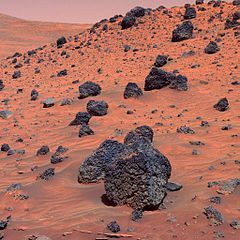
Spirit Rover views rocks on Mars
There could be solar flares
on the journey there,
Don’t forget crash landings
could happen, to be fair.
Water’s on the surface
but in a frozen brine.
Assume that you can boil out
enough to drink in time.
The atmosphere is toxic
but there is more to heed.
It’s less than one percent
of the pressure that you need.
Besides the lack of atmosphere,
no magnetic force surrounds,
So cosmic radiation
will force you underground.
Orange dust will be the bane
of your solar collectors,
Of moving parts and human lungs,
And of your airlock doors.
If your heating system fails
you will likely freeze,
And if you find your thumb’s not green,
Starvation adds to these.
You better hope you like your fellows
and avoid some fights.
It would be a shame to kill
each other in the night.
Your life’s a tough routine,
Your dangers aren’t a thrill.
Mars is unrelenting.
With its slow motion kill.
You’ve missed the deadline to apply to NASA’s astronaut program for Mars!  But, maybe that’s okay. cnet.com/au/news
But, maybe that’s okay. cnet.com/au/news
Join science fiction Mars colonists in my On Mars series. Colonists find all the dangers as they explore and build a home on Mars.
Filed under: Kate's Books, Poetry Tagged: dangers on Mars, hazards, mars, Mars colonist, Mars colony, mars survival tips, NASA, poem, poetry, science, space, Spirit rover








February 27, 2016
Latest Group of Martians Finish Their Mission #Mars #space #explore
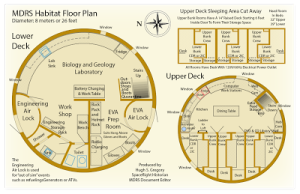 Could you live for eight months in a dome – about the size of two two-car garages stacked one on top of the other – sealed in with five coworkers? You’d be monitored via surveillance cameras and body-movement trackers. You’d have email and internet, but with a twenty minute lag (makes my rural-America internet look great!) You’d have some work to do outside your dome, but you’d have to wear a space suit.
Could you live for eight months in a dome – about the size of two two-car garages stacked one on top of the other – sealed in with five coworkers? You’d be monitored via surveillance cameras and body-movement trackers. You’d have email and internet, but with a twenty minute lag (makes my rural-America internet look great!) You’d have some work to do outside your dome, but you’d have to wear a space suit.
Sound like a new reality show?
It’s a NASA Mars Analog – the third mission ended recently. They’re learning what makes life more bearable – I noticed a few recipe contests – and what personality traits go into the best teams.
The University of Hawaii at Manoa leads this study, with support from team members at Cornell University, Michigan State University, Arizona State University, University of South Florida, the University of Maryland, the Institutes for Behavior Resources, Smart Information Flow Technologies, Blue Planet Foundation, and from the Pacific International Space Center for Exploration Systems (PISCES). http://hi-seas.org/
NASA’s not the only outfit worried about the technical and psychological problems that may assault the first humans on the Red Planet. The Mars Society has run over a dozen short Mars simulations.
Not all the obstacles can be tested on Earth: not the effects of low gravity, invasive dust, and the fact that no one can help you – at least, not for a long time. But we can study the social, interpersonal, and cognitive factors that affect teams. Biosphere Two tried a two-year experiment and that team had numerous interpersonal conflicts.
Of course, eight months may not be long enough to simulate what it will be like to be a Martian. Some volunteers are ready to spend the rest of their lives on Mars. It will be difficult and dangerous. Would you go?
Filed under: Neat Science News Tagged: Biosphere Two, explore, Hi-Seas, living on Mars, Mars One, Mars Society, mars survival tips, NASA











